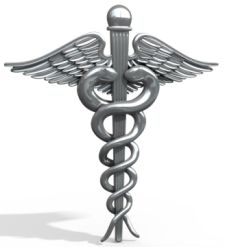Medical School and the English Major

“I love reading and writing, but I want to be a doctor, so I have to major in Biology. Don’t I?”
Hey, there’s nothing wrong with being a Bio major, and we have excellent science programs here. But if you enjoy reading, writing, and talking about good books, you don’t have to give that up quite yet. There’s more than one way up that Pre-Med mountain, and it’s quite possible to finish all the science prerequisites for medical school while pursuing a major in another field.
You may already know that the MCAT tests the specific body of knowledge covered by the standard (“hard science”) prerequisites for medical school. What you may not know is that the test itself consists mostly of short passages followed by groups of analytical and interpretive questions. This may explain why students who can combine the study of hard sciences with courses in traditional liberal arts disciplines like English tend to do better on the MCAT than students who are less well-rounded. One former English / Creative Writing major who did well on the exam (and who graduated from Loyola-Chicago’s Strich School of Medicine this past spring) described his advantage this way:
I attribute my success on the test to the way I approached it more than the knowledge I brought to it . . . I think those of us in reading / writing intensive majors tend to look into the test for the answers more. We're trained to read for content and to interpret that content, whereas most of the science majors I have dealt with have tried to rely solely on their own knowledge on the MCAT. I can't even tell you how many people [told me] they [didn't] even read the passages on the science sections of the MCAT, which is just absurd considering how much information is in there—if you know how to look for it.*
Students who major in English at the University of Scranton do a lot of reading and writing, and they are expected to write and speak with clarity and focus, and to use textual evidence in support of their arguments. Because of their training and experience in these areas, our students may be better able to respond with confidence and competence when they encounter the readings and the problem-solving questions on the MCAT.
“OK,” you might be thinking, “it’s possible—but has anyone actually done it?” Actually, yes. The Department of English & Theatre has an odd little winning streak going: the student who served as managing editor of Esprit (our student-run literary magazine) for the 2008-2009 academic year is currently a second-year medical student at Jefferson Medical College in Philadelphia (where she was part of a group that recently started a literary magazine for her fellow medical students). Not to be outdone, the managing editor of Esprit for the 2009-2010 academic year will be a first-year medical student at New York University this fall. Matt completed a double major in Biology and English, and Jen finished a double major in English and Philosophy, with (only) a minor in Biology.
We’re not saying that you have to major in English in order to do well on the MCAT and get into a good medical school. We’re just saying that it doesn't seem to hurt.
*Source:
https://forums.studentdoctor.net/showthread.php?s=3c150155e339ab95432366320f84d677&t=208983.
Accessed 10 August 2011.
Related Articles:
English and Theatre Department
Undergraduate Admissions
Contact Us:
- Susan Méndez, Ph.D., Chair
- English & Theatre
- McDade Center for Literary & Performing Arts
- Scranton, PA 18510
- The University of Scranton
- Phone: 570-941-4317
- susan.mendez@scranton.edu